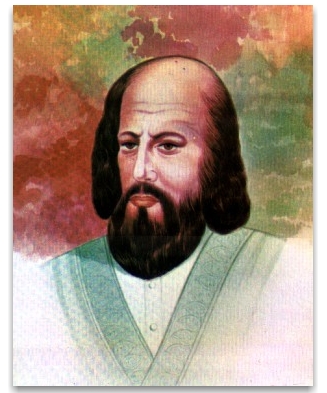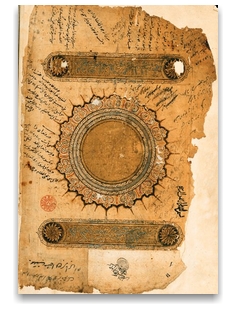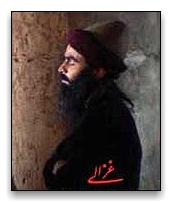The Alchemist of Happiness

Algazel, better known as al-Ghazali, was born Abu Hamid Ibn Muhammad Ibn Muhammad al-Tusi al-Shafi’i al-Ghazali in 1058 A.D. in Khorasan, Irandad, in the west of what is now called Iran. He was an Islamic theologian, philosopher, and mystic. He is considered one of the greatest theologians in Islam. Al-Ghazali made a significant philosophical contribution at a time which was important for the continuing legitimate existence of the sufi component of Islam.
al-Ghazali was appointed professor at Baghdad University in 1091. Following a spiritual crisis in 1095 he abandoned his career to become a Sufi mystic. After ten years of wandering he settled down to teach again [he had to be vigorously persuaded by his friends and well-wishers] a teaching which was inspired with his new mystical insights, and which he formulated very closely to orthodox Islam. Al-Ghazali was the author of several important works; his ‘Inconsistency of the Philosophers’, written just prior to his spiritual crisis, had a great influence on the future of speculative thought in Islam. Al-Ghazali’s chief work, The Revival of the Religious Sciences, outlines a complete and orthodox system of the mystical attainment of unity with God. Al-Ghazali is most important for his attempt to reconcile mysticism with orthodox Islam. He was well known in medieval Europe by his Latin name, Algazel.
From the Confessions of al-Ghazali
Quoth the Imam Ghazzali: Glory be to God, Whose praise should precede every writing and every speech. May the blessings of God rest on Muhammad His Prophet and His Apostle, on his family and companions, by whose guidance error is escaped. You have asked me, O brother in the faith, to expound the aim and the mysteries of religious sciences, the boundaries and depths of theological doctrines. You wish to know my experiences while disentangling truth lost in the medley of sects and divergencies of thought, and how I have dared to climb from the low-levels of traditional belief to the topmost summit of assurance. You desire to learn what I have borrowed, first of all from scholastic theology; and secondly from the method of the Talimites who, in seeking truth, rest upon the authority of a leader; and why, thirdly, I have been led to reject philosophic systems; and finally what I have accepted of the doctrines of the Sufis, and the sum total of truth which I have gathered in studying every variety of opinion. You ask me why, after resigning at Baghdad, a teaching post which attracted a large number of hearers, I have, long afterwards, accepted one at Nishapur…
Know then, my brothers (may God direct you in the right way), that the diversity in beliefs and religions, and the variety of doctrines and sects which divide men, are like a deep ocean strewn with shipwrecks, from which very few escape safe and sound. Each sect, it is true, believes itself in the possession of the truth and of salvation, ‘each party’, as the Koran saith, ‘rejoices in its own creed’; but as the chief of the apostles, whose word is always truthful, has told us – ‘My people will divide into more than seventy sects, of whom only one will be saved’. This prediction, like all others of the Prophet, must be fulfilled.
From the period of adolesence, that is to say, previous to reaching my twentieth year to the present time when I have passed my fiftieth, I have ventured into this vast ocean; I have fearlessly sounded its depths, and, like a resolute diver, I have penetrated its darkness and dared its dangers and abysses. I have interrogated the beliefs of each sect and scrutinized the mysteries of each doctrine, in order to disentangle truth from error and orthodoxy from heresy. I have never met one who maintained the hidden meaning of the Koran without investigating the nature of his belief, nor a partisan of its exterior sense without inquiring into the results of his doctrine. There is no philosopher whose system I have not fathomed, nor theologian the intricacies of whose doctrine I have not followed out. Sufism has no secrets into which I have not penetrated; the devout adorer of Deity has revealed to me the aim of his austerities; the atheist has not been able to conceal from me the real reason for his unbelief. The thirst for knowledge was innate in me from an early age; it was like a second nature implanted by God, without any will on my part. No sooner had I emerged from boyhood than I had already broken the fetters of tradition and freed myself from hereditary beliefs…
It is clear that al-Ghazali broke through the tyranny of the senses. In his own words, he says, “I am not the senses”…
I then set myself earnestly to examine the notions we derive from the evidence of the sense and from sight in order to see if they could be called into question. The result of a careful examination was that my confidence in them was shaken, … the eye sees a star and believes it as large as a piece of gold, but mathematical calculations prove, on the contrary, that it is larger than the earth. [Such] notions, and all others that the senses declare true, are subsequently contradicted and convicted of falsity in an irrefutable manner by the verdict of reason. Then I reflected in myself: Since I cannot trust the evidence of my senses, I must rely only on intellectual notions based on fundamental principles such as the axiom “Ten is more than three”…
al-Ghazzali went on further to break the stranglehold that Greek Philosophy had on all theology, Christian, Islamic, Jewish, at that time. His Inconsistency of the Philosophers, importantly, breaks through the tyranny of philosophy and reason on the mind and illustrates that there is in fact a mystical, direct knowing of God which can be experienced without the dictates of reason and the mind … al-Ghazali continues:
God at last deigned to heal me of this mental malady; my mind recovered sanity and equilibrium, the primary assumptions of reason recovered with me all their stringency and force. I owed my deliverance, not to a concatenation of proofs and arguments, but to the light which God caused to penetrate into my heart—the light which illuminates the threshold of all knowledge. To suppose that certitude can only be based upon formal arguments is to limit the boundless mercy of God. Someone asked the Prophet the explanation of this passage in the Divine Book: “God opens to Islam the heart of him whom He chooses to direct.” “That is spoken,” replied the Prophet, “of the light which God sheds in the heart”. “And how can man recognize this light?” he was asked. “By his detachment from this world of illusion and by a secret drawing towards the eternal world”, the Prophet replied. … This is corroborated by another saying of the Apostle: “God sends upon you, at certain times, breathings of His grace; be prepared for them.” My object in this account is to make others understand with what earnestness we should search for truth…
From a Letter to His Disciple
Shaqiq al-Balkhi asked his companion Hatim al-Asamm: “You have kept company with me for thirty years. What have you got out of them?”
Hatim al-Asamm replied that he got eight useful lessons that sufficed him.
These were:
1. Good Deeds are the best Object of Love
Everyone has an object of love which accompanies him till various levels: some till death and some even to the grave but not beyond that. So, the best thing worthy of being loved is that which accompanies one in the grave to be a light, friend and companion there, and this is good deeds.
2. Prohibit the nafs (Ego) from its desires
People fulfill the desires of their ego. The Qur’an says: “But for him who fears the station of his Lord and kept the soul back from vain pleasures, the Garden is his abode.” So I restrained my nafs and combated with it until it gave up and became satisfied with obedience to Allah Most High.
3. Rid yourself of the excesses of the dunya/world (since it has a high opportunity cost)
I saw people accumulate worldly things and meditated on the verse: “What is in your possession dwindles and what is in Allah’s possession is eternal?” So I sacrificed worldly gains, distributed them among the poor, so that they might become a treasure for me with Allah.
4. Nobility lies in taqwa (piety)
People have various opinions regarding what is noble: wealth, tribe, spending lavishly – and they take pride in it. The Quran says: “The noblest of you in the view of Allah is the most God-conscious of you.” So I chose taqwa/piety, believing the Quran to be the truth and the opinions to be empty falsehoods.
5. Everything is from Allah, so envy is meaningless
People blamed and slandered others due to envy regarding fame, wealth, knowledge. Allah says: We distribute their sustenance amongst them in the life of this world. So, distribution was from Allah and I was content with His distribution. (having envy implies being unhappy with Allah Most High’s distribution).
6. Shaitan (Satan) is the only enemy
People acted with hostility towards others due to various motives. Allah says: “Verily, Satan is an enemy to you, so take him as an enemy“, and I understood that enmity towards anyone else was not allowed.
7. Sustenance is from Allah only, so sever hope from others
People strive for livelihood, often falling into the dubious and unlawful thus degrading themselves. Allah says: “No beast is on earth without its provision depending on Allah“. So I occupied myself with worshiping him and severed hope from other than Him.
8. Rely only on Allah
I saw everyone replying on created things: money, wealth, trade, others; so I meditated on His statement: “And whoso relies upon Allah – He is his sufficiency. Verily, Allah brings His command to pass. Allah has made a portion for everything.” So I relied on Allah and He is my sufficiency and most excellent trustee.

from the cover of Alchemist of Happiness
We finish with an extract of the beginning of al-Ghazali’s commentary on the Ninety Nine Beautiful Names of God.
As for His saying Allah, it is a name for the true existent, the one who unites the attributes of divinity, is subject of the attributes of lordship, and unique in true existence. For no existent thing other than He may claim to exist of itself, but rather it gains existence from Him: it is perishing insofar as it exists of itself, and exists insofar as it faces Him. For “every existing thing is perishing except His face”. It is most likely that in indicating this meaning [Allah] is analogous to proper names, so everything which has been said about its derivation and definition is arbitrary and artificial.
A lesson. You should know that this name is the greatest of the ninety-nine names of God—great and glorious—because it refers to the essence which unites all the attributes of divinity, so that none of them is left out, whereas each of the remaining names only refers to a single attribute: knowledge, power, agency, and the rest. It is also the most specific of the names, since no-one uses it for anyone other than Him, neither literally nor metaphorically, whereas the rest of the names may name things other than He, as in ‘the Powerful’, ‘the Knowing’, ‘the Merciful’, and the rest. So in these two respects it seems that this name is the greatest of these names.
Impact of al-Ghazali
While Sufism is said to have incorporated elements of Christian monasticism, gnosticism, and Indian mysticism, its origins are traced to forms of devotion and groups of penitents (zuhhad) in the formative period of Islam. The word Sufi first appears in the 8th cent., probably in connection with the coarse wool that many ascetics wore. Two central Sufi concepts are tawakkul, the total reliance on God, and dhikr, the perpetual remembrance of God. The introduction of gnostic elements (marifa) into Sufism is often attributed to growing opposition from orthodox clerics. The scholastic and ecstatic paths further diverged with the concept of fana, the dissolution into the divine, advocated by al-Bistami (d. 874), and used by Hallaj in the declaration of his unity with God, which eventually led to his execution in 922. Islamic orthodoxy and Sufism were not unreconcilable. Al-Ghazali is credited with infusing conformist Muslim religious life with mysticism, through his works, particularly his “Revival of the Religious Sciences”.

![]()

